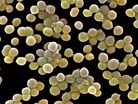New MRSA superbug strain found in British cow milk

Humans are being infected with a new strain of the MRSA superbug which has been found in British cow milk.
According to environmental campaigners the new strain has surfaced because of intensive farming methods and the heavy use of antibiotics by dairy-farmers.
However, experts are saying there is no health risk in eating dairy products but they do believe there is strong evidence which shows MRSA is being passed between cows and humans.
READ MORE FROM THE WDM CONTENT NETWORK:
To read the latest edition of Healthcare Global, click here
- Meditation helps to relieve stress and beat depression
- The Priory: A top-class research facility
- Diet and exercise tips to control weight loss
MRSA stands for ‘methicillin-resistant Staphylococcus aureus’ and refers to a drug-resistant form of bacteria which can be fatal if it infects wounds.
It is commonly found in hospitals and in 2007 it was thought to be responsible for causing 1,593 deaths but since then its incidence rate has fallen dramatically with 1,290 MRSA-related deaths in 2008 and 781 in 2009.
There are 35 different strains of antibiotic resistant superbugs which are all relatively similar but the newly identified superbug is very different from others.
Experts believe it originated in cows and it is being dubbed the ‘new MRSA’.
Antibiotics are frequently used to treat cows with mastitis; an inflammation of the udder tissue.
However, if such medication is overused bacteria and illnesses can become resistant to treatments which then make infections difficult to treat should humans contract them.
Dr Mark Holmes, who led the research at Cambridge University in the UK believed that financial pressure was to blame for dairy-farmers reliance on antibiotics:
“If you drive your cows harder to produce more milk you get more mastitis,” he said at a news conference.
The Soil Association and the US Food and Drug Association (FDA) are calling for a ban on the use of antibiotics in farm feed.
Helen Browning is the director of the Soil Association and said in an interview: “This new evidence confirms our long-held view of the importance of absolutely minimising the use of antibiotics especially those closely related to antibiotics used by people.”



